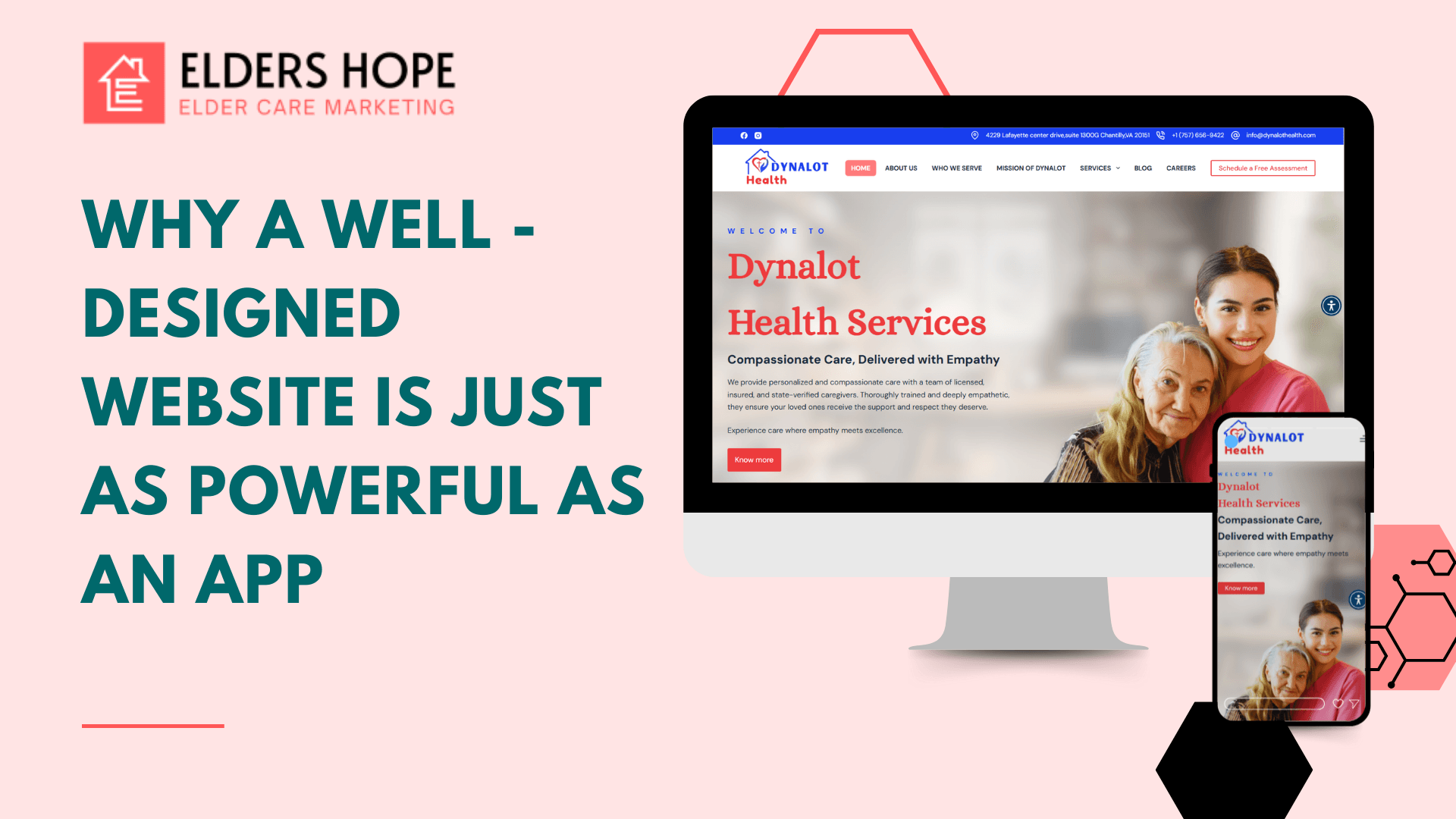Get your healthcare website



In today’s fast-paced digital world, we often find ourselves comparing websites and mobile apps. Both serve unique functions, yet some argue that a well-designed website can be just as powerful as an app. But how true is this statement? Well, it’s time to take a deep dive into why a great website could be just as effective, if not more, than a mobile app. Let’s explore.
When it comes to online presence, first impressions matter. A user’s decision to stay on your site or leave within seconds often depends on its design and functionality. A well-designed website offers a seamless user experience from the moment visitors land on your homepage.
The layout, color scheme, and intuitive navigation guide them effortlessly toward the content they need. If your website is visually appealing, easy to use, and responsive across all devices, users are more likely to engage with it, explore your offerings, and take the desired actions—whether that’s making a purchase, signing up for a newsletter, or filling out a contact form.
While apps are great for mobile users, a well-designed website doesn’t have the same limitations. Whether on a desktop, tablet, or smartphone, a well-designed website offers consistent accessibility.
Unlike apps, which require users to download and install software, websites can be accessed directly through a browser, making them instantly available to anyone with an internet connection. With responsive design, a well-designed website automatically adjusts its layout and content for optimal viewing, regardless of the device being used.
In a world where consumers expect fast access to information, having a mobile-friendly, responsive website can give your business a significant edge. It ensures your customers can reach you no matter where they are, whether they’re browsing on a computer at work or checking out your products, while delivering a consistent and enjoyable experience that builds trust, boosts engagement, and drives conversions.
While both websites and apps serve similar purposes—engaging users and providing them with relevant content—there are some key differences that set them apart. Let’s break down these differences:
A well-designed website can provide an excellent user experience (UX). When built with attention to detail, websites can be easy to navigate, responsive, and intuitive—just like apps. With the right design, websites can mirror app-like functionalities, creating a smooth experience for users.
A major advantage of websites over apps is that websites can be designed with responsiveness in mind. Responsive design ensures that your website adjusts its layout based on the device it’s being viewed on—whether it’s a large desktop monitor or a small smartphone screen.
In essence, your website becomes an all-in-one solution for different screen sizes without the need for multiple versions of the same content, which can happen with apps.
While mobile apps certainly have their place, mobile websites are evolving and becoming more powerful. Mobile websites are now designed with mobile-first approaches, ensuring that they load quickly and are easy to use on smaller screens. With mobile-responsive designs, they deliver an experience comparable to mobile apps, often making them a more cost-effective and universally accessible choice.
Search Engine Optimization (SEO) is crucial for any online presence. A website that is designed with SEO in mind is more likely to rank higher in search engine results, driving more traffic and increasing visibility. Factors such as page load speed, mobile optimization, and structured data can significantly impact SEO rankings.
Google has made it clear that page load speed is a key ranking factor. Websites that are slow to load can negatively impact the user experience and search engine rankings. A well-designed website that is optimized for speed ensures both a great user experience and better SEO performance.
With well-organized content and easy navigation, websites can offer a better user experience. This is a key factor in SEO because search engines favor websites that allow users to easily access valuable content. Websites designed with clear headings, easy-to-read text, and relevant keywords are more likely to rank higher in search results.
Building and maintaining an app can be expensive. Not only do you have to develop separate versions for different platforms (iOS, Android, etc.), but you also have to keep track of app store guidelines, updates, and security patches.
Websites, on the other hand, can be developed and maintained more cost-effectively with a single version that works across all platforms.
If you’re looking for affordable senior care website design solutions tailored for small agencies, check out Affordable Senior Care Website Design Solutions for Small Agencies.
When it comes to security, both websites and apps require attention. A well-designed website can have robust security features to protect users’ data, just like mobile apps. HTTPS, SSL certificates, and two-factor authentication are examples of security measures that can be implemented on websites, ensuring a safe experience for users.
While apps may be better suited for certain industries, websites are often more versatile. For businesses that rely on providing information, e-commerce, or customer service, a website can serve as a one-stop-shop for all user needs.
A well-designed website can reach a broader audience compared to apps, as anyone with an internet connection can access it. Apps, on the other hand, limit accessibility to users who have downloaded the app.
Updating a website is much easier compared to an app. Websites allow businesses to quickly make changes, update content, or launch promotions without waiting for an app update approval.
To ensure your website rivals the power of an app, certain design elements are key:
A clutter-free design with easy navigation is vital to a good user experience. Visitors should never feel lost on your website.
A slow website can frustrate users and make them leave. Optimizing your site’s performance is critical to retaining visitors.
With most users accessing the web through mobile devices, ensuring your website is mobile-friendly is non-negotiable.
Engaging and informative content is at the core of any well-designed website. It should provide value to users while being optimized for search engines.
Your website should reflect your brand’s identity clearly, with consistent fonts, colors, and imagery that resonate with your audience.
In conclusion, while apps have their place in the digital ecosystem, a well-designed website can be just as powerful. Offering universal access, cost-effectiveness, SEO advantages, and a user-friendly experience, websites have proven to be indispensable tools for businesses and individuals alike. Whether you are aiming for a professional portfolio or an e-commerce hub, the right website design can make all the difference.
For personalized guidance on affordable senior care website design, reach out to us or visit our Facebook page to get started.
Get a free consultation on website design and marketing.